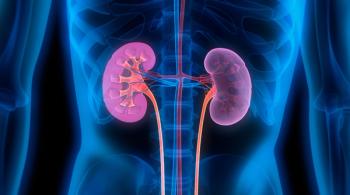
Risa Kagan, MD, discusses the efficacy of fezolinetant in reducing the frequency and severity of vasomotor symptoms in menopausal women, offering an alternative to traditional hormonal therapies.

Risa Kagan, MD, discusses the efficacy of fezolinetant in reducing the frequency and severity of vasomotor symptoms in menopausal women, offering an alternative to traditional hormonal therapies.

Review some of the top stories from the Contemporary OB/GYN website over the last week, and catch up on anything you may have missed.

A recent study highlights a 35% reduction in severe maternal morbidity risk with epidural analgesia during labor, with even greater benefits for women with specific risk factors.

Research revealed that group multimodal prenatal care offers improved or equivalent postpartum outcomes compared to individual care, particularly in managing perceived stress and sleep duration.

A recent study reveals that heat waves significantly elevate the rates of preterm and early-term births, highlighting a critical public health issue.

A recent study reveals significant correlations between placental and cord serum metabolism at delivery, influencing neurodevelopmental outcomes in children with a high familial risk of autism spectrum disorder.

Following evidence from recent studies, the Centers for Disease Control and Prevention has recommended the use of doxycycline postexposure prophylaxis in sexual health among certain populations.

A recent study reported an increased risk of mortality when diagnosed with premenstrual disorders at an early age, as well as overall increased suicide risk.

A study revealed that the Dobbs v Jackson Women’s Health Organization decision has led to more out-of-state abortions and longer gestation periods in states such as Washington with legalized abortion.

Postpartum anemia affects 22% to 50% of women in developed countries, leading to increased morbidity and making effective detection and iron supplementation essential for improved maternal health.

Review some of the top stories from the Contemporary OB/GYN website over the last week, and catch up on anything you may have missed.

Wanda Barfield, MD, MPH, highlights significant racial disparities in maternal mortality and emphasizes the importance of collaborative efforts and data-driven approaches to improve maternal health outcomes in the United States.

New research reveals that acute increases in physical activity and ambient temperature can elevate the risk of both objective and subjective hot flashes in postmenopausal women.

A study found a significant decline in mental health therapy sessions among US military parents during the months surrounding childbirth, highlighting the need for more accessible treatment options.

Recent research reveals a correlation between preeclampsia and heightened risk of young-onset dementia, shedding light on potential long-term consequences of this pregnancy complication.

A recent study investigated the effects of antenatal tocolysis on neurodevelopmental outcomes among children aged 5.5 years following preterm prelabor rupture of membranes, revealing no significant differences in outcomes.

A recent study found that obese patients undergoing induction of labor experienced similar delivery times regardless of whether they received 50 μg or 25 μg of vaginal misoprostol, though multiparous patients showed faster delivery with the higher dosage.

A recent study highlighted the significant association between adverse pregnancy outcomes and an elevated long-term risk of chronic kidney disease, emphasizing the need for heightened awareness and monitoring.

A recent study highlights the necessity of optimizing secondary prevention strategies to mitigate adverse cardiovascular outcomes in patients with HIV who face higher risks.

Review some of the top stories from the Contemporary OB/GYN website over the last week, and catch up on anything you may have missed.

A recent study reveals a significant association between accelerated biological aging and preterm birth, highlighting the need for further research into this potential risk factor.

Utilizing magnetic resonance imaging and ultrasound models to predict fetal weight in primigravid women can significantly reduce macrosomia-related adverse outcomes, with MRI showing superior accuracy.

A recent study reports that ring expulsions are infrequent and unrelated to body mass index or parity, with satisfaction rates remaining high among users.

A recent study reveals that adolescents with autism and other developmental disabilities have fewer visits to obstetrician-gynecologists and lower hormonal contraceptive use compared to their typically developing peers, highlighting a need for improved reproductive health services.

A recent study reveals similar overall reintervention risks between a 52-mg levonorgestrel-releasing intrauterine system and radiofrequency endometrial ablation for treating heavy menstrual bleeding.

A recent study reveals no significant association between COVID-19 vaccination and the incidence of abnormal uterine bleeding among reproductive-aged women.

Review some of the top stories from Contemporary OB/GYN's coverage of ACOG 2024, and catch up on anything you may have missed.

A new study highlights significant levels of harassment in obstetrics and gynecology, emphasizing the urgent need for effective interventions.

Mary Claire B. Manske, MD, discusses her findings on the unexplained increased risk of brachial plexus birth injury among Black and Hispanic infants, highlighting the need for improved prenatal care and further research.

Experts discuss the necessity of evolving prenatal care through innovative models to better meet patient needs and incorporate advances such as telemedicine.